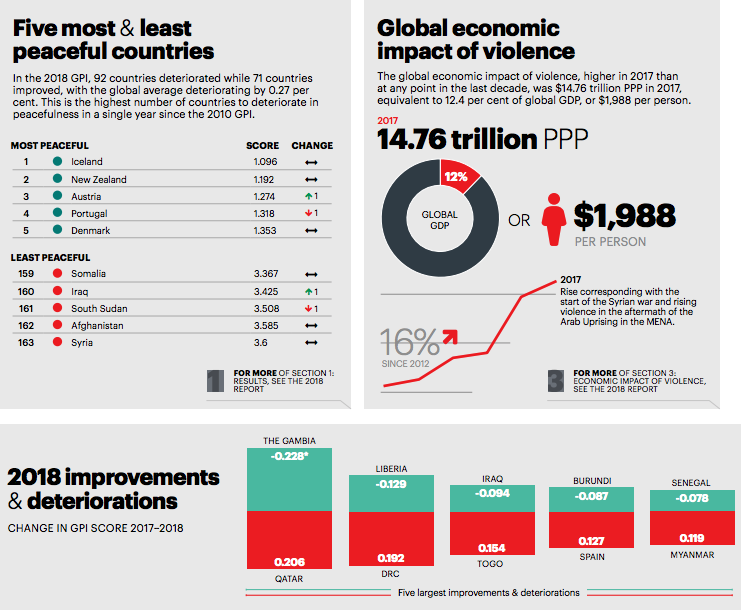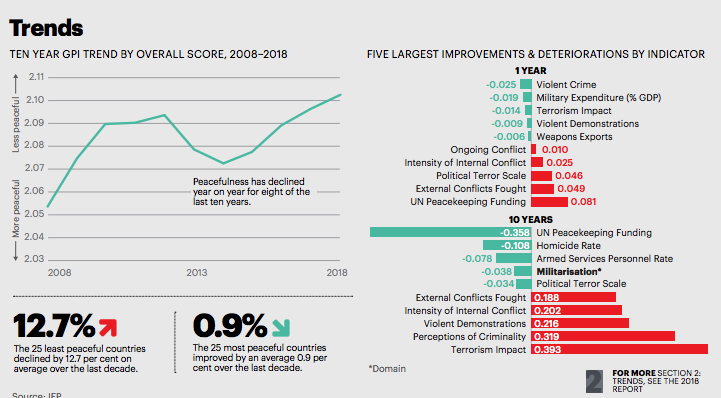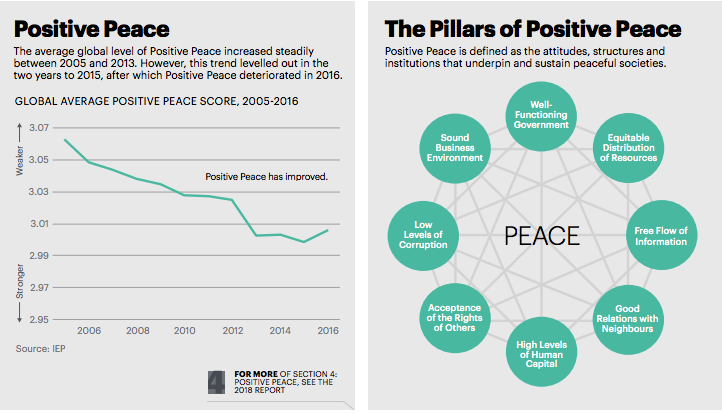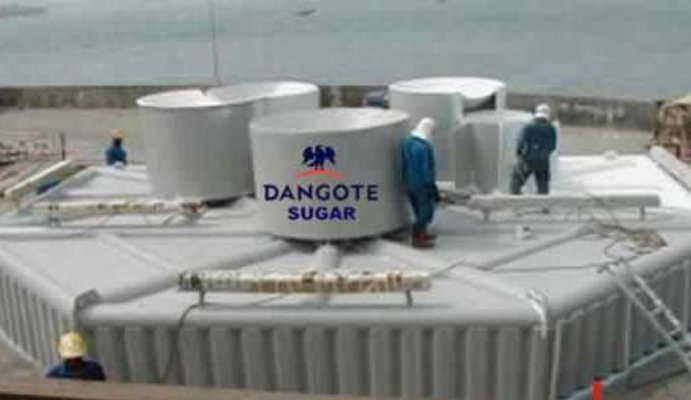The economic impact of violence to the global economy rose 2.1 percent to $14.76 trillion in 2017, in constant purchasing power parity (PPP) terms, which is an equivalent to 12.4 percent of world gross domestic product (GDP), or $1,988 per person, according to the 2018 Global Peace Index (GPI) produced by the Institute for Economics and Peace (IEP).
The 2018 GPI, which ranks Nigeria 148 out of 163 independent states and territories according to their level of peacefulness, revealed that global peacefulness declined for the fourth straight year, with the average level of country peacefulness deteriorating by 0.27 percent last year, as a result of growing authoritarianism, unresolved conflicts in the Middle East and North Africa, and increased political instability across the world.


Ninety-two countries deteriorated, while 71 countries improved. The 2018 GPI reveals a world in which the tensions, conflicts, and crises that emerged in the past decade remain unresolved, especially in the Middle East, resulting in this gradual, sustained fall in peacefulness.
The global economic impact of violence is defined as the expenditure and economic effect related to “containing, preventing and dealing with the consequences of violence.” The estimates include the direct and indirect cost of violence as well as an economic multiplier. The multiplier effect calculates the additional economic activity that would have accrued if the direct costs of violence had been avoided.
According to the index, global economic impact of violence increased in 2017, mainly due to a rise in internal security expenditure, adding that economic impact of violence has increased 16 percent since 2012, corresponding with the start of the Syrian war and rising violence in the aftermath of the Arab uprising in Libya, Yemen and other parts of the Middle East and North Africa.
It said the economic impact of the conflicts in Afghanistan and Iraq also increased between 2012 and 2017, due to the rise of ISIL and its global affiliates.
The GPI puts the average economic cost of violence at an equivalent to 45 percent of GDP in the ten countries most affected by the impact of violence, compared to two percent in the ten least affected.
Syria, Afghanistan, and Iraq incurred the largest economic cost of violence as a percentage of their GDP at 68, 63 and 51 percent of GDP, respectively
“Of the 14 West African nations, the overall scores of only two – Niger and Nigeria – deteriorated last year. There were substantial sub-regional improvements in the domain of Safety and Security, including Liberia by eight percent, the Gambia by 5.9 percent, and Ghana by 5.5 percent.
“The most notable West African exceptions were Togo and Cameroon. In Togo, which had the region’s second largest deterioration, tens of thousands of people took to the streets to demand the resignation of President Faure Gnassingbé, whose family has ruled the country for 50 years. Cameroon, with the region’s third-largest deterioration, has seen Anglophone secessionists launch a number of attacks on government security forces during the year,” the GPI stated.
It noted that the Lake Chad basin region continues to have problems with Boko Haram and a humanitarian crisis brought on by prolonged drought. The United Nations estimates that almost 11 million people need humanitarian assistance in the Lake Chad Basin.
“Boko Haram’s geographic reach shrank in 2017, leading to a reduction in the impact of terrorism in the groups’ principal areas of operations in Nigeria, Niger, Cameroon, and Chad, although they still remain a threat. The group seems to have switched tactics from relying on armed assaults to suicide bombings,” it said.
The GPI is the world’s leading measure of global peacefulness. This report presents the most comprehensive data-driven analysis to-date on trends in peace, its economic value, and how to develop peaceful societies.
The GPI covers 99.7 percent of the world’s population, using 23 qualitative and quantitative indicators from highly respected sources, and measures the state of peace using three thematic domains: the level of societal safety and security; the extent of ongoing domestic and International Conflict; and the degree of militarisation.
In addition to presenting the findings from the 2018 GPI, this year’s report includes analysis of trends in positive peace: the attitudes, institutions, and structures that create and sustain peaceful societies. It looks at changes in indicators of positive peace that immediately precede deteriorations or improvements in peacefulness, which provides a framework for predictive analysis.
The report also assesses the ways in which high levels of peace positively influence major macroeconomic indicators.
Underlying the fall in peacefulness, six of the nine regions in the world deteriorated in the last year. The four most peaceful regions – Europe, North America,
Asia-Pacific, and South America – all recorded deteriorations, with the largest overall deterioration occurring in South America, owing to falls in the safety and security domain, mainly due to increases in the incarceration rate and impact of terrorism. Iceland remains the most peaceful country in the world, a position it has held since 2008. It is joined at the top of the index by New Zealand, Austria, Portugal, and Denmark. Syria remains the least peaceful country in the world, a position it has held for the past five years.










